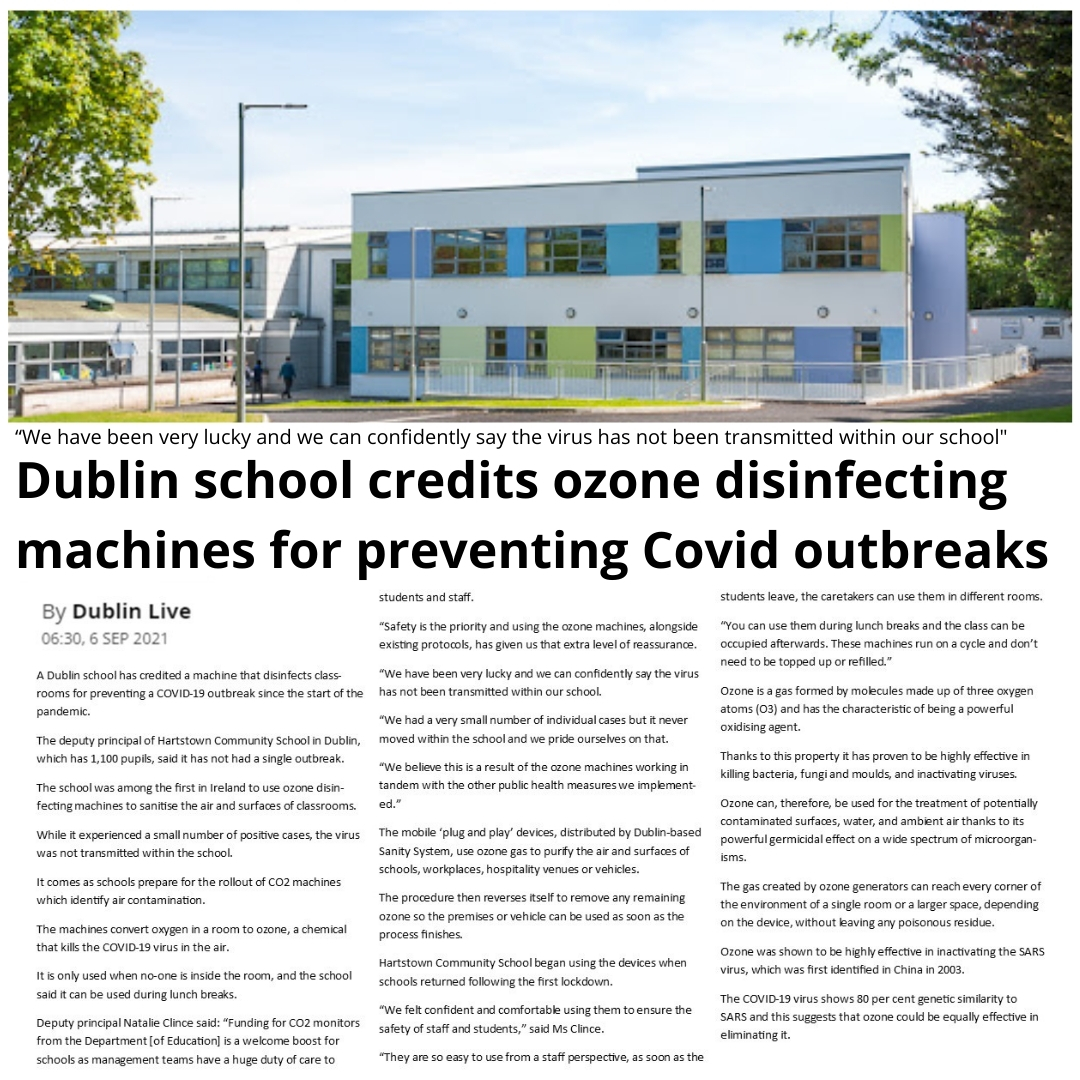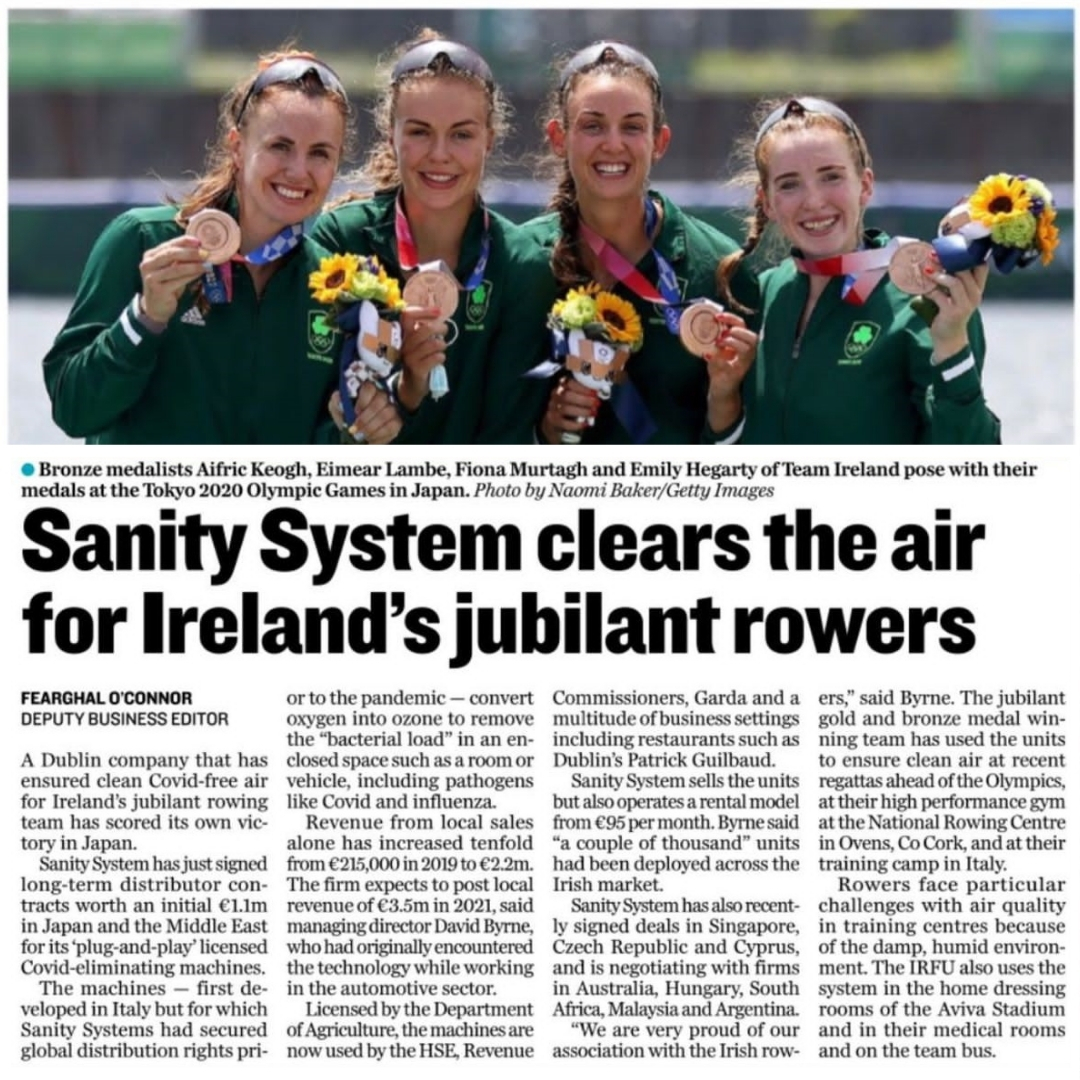
Press
Due to the global COVID-19 pandemic, the efficacy of the cleaning and sanitisation process in public spaces and at home is being questioned.
The media are now investigating what the new best practices are for cleaning and disinfecting in order to provide safer work and home spaces.
Dublin school credits ozone disinfecting machines for preventing Covid outbreaks 06/09/2021 By Dublin Live
“We have been very lucky and we can confidently say the virus has not been transmitted within our school”
A Dublin school has credited a machine that disinfects classrooms for preventing a COVID-19 outbreak since the start of the pandemic.
The deputy principal of Hartstown Community School in Dublin, which has 1,100 pupils, said it has not had a single outbreak.
The school was among the first in Ireland to use ozone disinfecting machines to sanitise the air and surfaces of classrooms.
While it experienced a small number of positive cases, the virus was not transmitted within the school.
Sanity System clears the air for Ireland’s jubilant rowers 01/08/2021 Irish Inderpendant News By Fearghal O’Connor
A Dublin company that has ensured clean Covid-free air for Ireland’s jubilant rowing team has scored its own victory in Japan.
Sanity System has just signed long-term distributor contracts worth an initial €1.1m in Japan and the Middle East for its ‘plug-and-play’ licensed Covid-eliminating machines.
The machines — first developed in Italy but for which Sanity Systems had secured global distribution rights prior to the pandemic — convert oxygen into ozone to remove the “bacterial load” in an enclosed space such as a room or vehicle, including pathogens such as Covid and influenza.

New eco-friendly disinfection service provider Ozone Disinfection Australia 28/01/2021 Ticker News
Finding ways to keep us safe from germs while also being environmentally friendly with General Manager of Ozone Disinfection Australia – Steve Lowe.
How long do cold and flu viruses stay contagious on public surfaces
17/12/2018 by Julia Griffin & Nsikan Akpan‘Tis the season for gathering with friends and family to share latkes and gingerbread, but also for those dreaded colds and bouts of the flu.
As temperatures drop, both illnesses start to tick up, as does the risk of taking you, your co-workers and loved ones down one-by-one. The Centers for Disease Control and Prevention estimate the average person gets two to three colds per year — mostly in the winter and spring. The country as a whole sees 9.3 to 49 million cases of the flu annually.
Queensland’s top doctor warns life won’t suddenly return to normal with a coronavirus vaccine
15/10/2020 by Talissa Siganto‘I don’t know what’s going to get us out of this’: Queensland’s CHO says a vaccine won’t solve our COVID-19 troubles
Queensland’s Chief Health Officer Dr Jeannette Young warns life won’t suddenly return to normal with a coronavirus vaccine and says young people could become “a totally lost generation”.
Virus that causes COVID-19 survives up to 28 days on surfaces, Australian scientists find
12/10/2020 by Sophie ScottAustralian scientists reveal new insights into how long coronavirus survives on surfaces
New Australian research finds the coronavirus that causes COVID-19 can live for up to 28 days on surfaces such as mobile phone screens and ATMs — much longer than previously thought.
Why NSW will not be rid of coronavirus any time soon
7/10/2020 by Jonathan HairThe truth is, despite no new locally acquired coronavirus cases being recorded in NSW for the past 12 days, Australia’s most populous state has never been rid of the virus.
Coronavirus hygiene fatigue? Here’s your handwashing, social distancing and face mask reminder
27/08/2020 by Jason DaseyTwo leading infectious disease experts say now is not the time to relax best practices, even in parts of Australia where there are no COVID-19 cases.

Employers could be held liable for workers who contract COVID-19
Employers could be held liable for workers who contract coronavirus on the job, lawyers say.
As restrictions ease and workers prepare to return to offices, employers are being warned they need to adhere to the health guidelines or they face serious legal trouble.

Workplace cleaners are on the frontline of the coronavirus pandemic. They need enough time to do their job.
Employers have extra concerns. High quality cleaning is the key to shielding them from liability should their workers contract COVID-19 and they run the risk of having to shut their workplaces down again.





